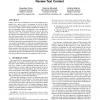Free Online Productivity Tools
i2Speak
i2Symbol
i2OCR
iTex2Img
iWeb2Print
iWeb2Shot
i2Type
iPdf2Split
iPdf2Merge
i2Bopomofo
i2Arabic
i2Style
i2Image
i2PDF
iLatex2Rtf
Sci2ools
WEBDB
2009
Springer
2009
Springer
Beyond the Stars: Improving Rating Predictions using Review Text Content
Online reviews are an important asset for users deciding to buy a product, see a movie, or go to a restaurant, as well as for businesses tracking user feedback. However, most reviews are written in a free-text format, and are therefore difficult for computer systems to understand, analyze, and aggregate. One consequence of this lack of structure is that searching text reviews is often frustrating for users. User experience would be greatly improved if the structure and sentiment conveyed in the content of the reviews were taken into account. Our work focuses on identifying this information from free-form text reviews, and using the knowledge to improve user experience in accessing reviews. Specifically, we focused on improving recommendation accuracy in a restaurant review scenario. In this paper, we report on our classification effort, and on the insight on user-reviewing behavior that we gained in the process. We propose new ad-hoc and regression-based recommendation measures, th...
| Added | 25 May 2010 |
| Updated | 25 May 2010 |
| Type | Conference |
| Year | 2009 |
| Where | WEBDB |
| Authors | Gayatree Ganu, Noemie Elhadad, Amélie Marian |
Comments (0)

